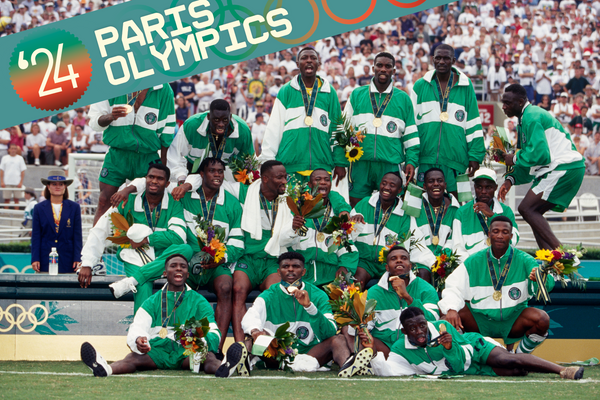Nigeria in the 1990s was largely defined by the most brutal autocracy it has ever seen. In 1993, after a decade of military rule, Nigerians voted in widely anticipated elections. GeneralIbrahim Babangida, then head of state for 8 years, annulled the election results for alleged vote buying, resigned from his post and handed over to an interim government that was eventually overthrown by GeneralSani Abacha.
Within the period of Abacha’s reign of terror, Nigerian men’s football delivered some of its greatest feats ever, headlined by winning gold at the Atlanta ‘96 Olympics. The team, headlined by folk heroes like Nwankwo Kanu, Austin “Jay Jay” Okocha, Daniel Amokachi and more, stormed its way into unprecedented triumph.
To date, gilded memories of that Olympics gold, one of the two Nigeria won in Atlanta, remain communal folklore. “When Nigeria win Brazil…” goes the opening of the ultra-popular chant that still rings around stadiums when the national team plays. The memory of that team, of that era in Nigerian football, is often looked at through the rose-tinted lens of nostalgia, but it’s impossible to divorce those footballing highs from the socio-political mayhem in the country at the time.
www.youtube.com
Nigeria’s journey to Olympic Football gold
“Politically, we were in a mess, but football gave the people hope,” Okocha says in Super Eagles ‘96, a 93-minute documentary that centers the historic Olympics triumph. Directed by Yemi Bamiro, the doc puts the gold medal win within the context of what it meant to be a Nigerian at the time, living in “a police state situation,” as the culture connoisseur Obi Asika puts it.
“These are the dark days and the brief moments of shining lights were brought by football,” Asika says.
Two years before the Olympics, Nigeria won the African Cup of Nations for the second time. It was the culmination of a football program headed by Dutch coach, Clemens Westerhof, who personally scouted players from the local league and kept tabs on players abroad. Upon usurping power, General Abacha held a meeting with Westerhof and the country’s administrators, committing to do all in his power to support the national team to qualify Nigeria for its first World Cup berth.
At the ‘94 World Cup in the U.S., the team exited in the second round, a decent outing for a team making its debut on the biggest stage in world football. The next major tournament was supposed to be a chance for the Super Eagles to defend its AFCON title, however, Nigeria under Abacha’s rule was under intense global scrutiny for its human rights violations, underlined by the execution of environmental activist and writer Ken Saro-Wiwa and nine other leaders of the Movement for the Survival of Ogoni People (MOSOP).
After that, Nigeria was, amongst other international sanctions, suspended from the Commonwealth, a decision that was recommended by anti-apartheid hero and then South AfricanPresident Nelson Mandela. This led to tensions between Nigeria and South Africa, and would effect the withdrawal of the Super Eagles from the ‘96 AFCON hosted in, and eventually won, by South Africa.
Missing AFCON made playing in the Olympics even more important, but things were far from smooth. In his book about the ‘96 gold medal team, The Making of Nigeria’s Dream Team, respected sports journalist Mumini Alao revealed that some players had to pay for team expenses with their credit cards, renting buses for the team and even driving the buses to and from training themselves. The conditions were so bad players had to wash their training kits themselves after each session.
“That gold medal win was mainly about grit,” Olaleye Adedoyin, a former Nigerian sports writer who now lives in Ireland, tells OkayAfrica. “I think the sanctions on the Nigerian government at the time made it difficult for Abacha to assist the team. Also, I don’t think anyone expected them to go far in that competition, much less even win.”
Prior to Atlanta ‘96, Nigeria’s football team had appeared at three Olympic Games and failed to win any match. This was also the first time it was appearing in the competition with its Under-23 team, after the rule that only allowed U-23 football teams was implemented at Barcelona ‘93. However, several core members of the main Super Eagles were young enough to be in the squad, and they were complemented by newcomers like Taribo West and talisman striker Nwankwo Kanu. Overall, the squad included seven players still in their teens.
While they stayed in $10 motel rooms, with players alternating hours between sleeping on the bed and on the floor, the Jo Bonfrère-coached “Dream Team” delivered million dollar performances, as they won five of their six matches. Their heroics were sealed by two hard-fought victories against Brazil and Argentina in the semi-finals and final match, respectively.
www.youtube.com
Nigeria vs Brazil – Men’s Football Semi-Final Atlanta 1996 | Atlanta 1996 Replays
“Nigeria was one very, very large mosh pit,” Nigerian lawyer and historian Ed Keazor says in Super Eagles ‘96, describing the immediate aftermath of the gold medal win. “We needed heroes and these players gave us heroes.”
The juxtaposition of the euphoria caused by the Nigerian team’s gold medal feat with the grim political situation in the country makes it one of the fondest times in national consciousness, especially with regards to sports. It also epitomized the trademark resilient spirit often associated with Nigerians, the will to get through regardless of how dire the conditions are.
“We represented hope that something good can come out of a bad situation,” Okocha says in the doc. “In Nigeria… reputation wise, we were in a mess, but that changed a lot of people’s view about Nigeria and gave hope.”
From Your Site Articles
Related Articles Around the Web
Source link : https://www.okayafrica.com/amp/nigeria-football96-olympics-2668779364
Author :
Publish date : 2024-07-19 16:40:18
Copyright for syndicated content belongs to the linked Source.
